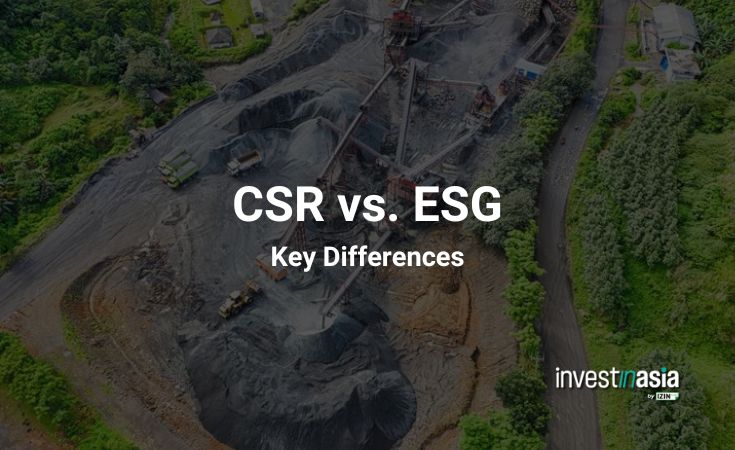The rising popularity of responsible investment and sustainable finance, along with increased conscious consumerism, has pressured companies to prioritize transparency in measuring and managing environmental, social, and governance (ESG) risks and opportunities. Beyond investors, corporate stakeholders, and recent regulations, consumers and employees demand more information on how businesses address their social and environmental impacts.
However, confusion abounds as to where companies should place their focus, often portrayed as an “alphabet soup” of acronyms and institutions. So, what exactly is the difference between CSR (Corporate Social Responsibility) and ESG (Environmental, Social, Governance)?
Also read; The Importance of Location in Business (7 Key Reasons)
CSR and ESG: Similar, but Distinct


Historically, the terms CSR (Corporate Social Responsibility) and ESG (Environmental, Social, and Governance) were used interchangeably in sustainability reports. However, while CSR and ESG have similar aims and origins, they are distinct concepts:
- CSR: Refers to a company’s ethical and responsible operation, considering its impact on society, the environment, and stakeholders.
- ESG: Extends the CSR concept by requiring integration into the company’s core purpose, supported by concrete evidence and data, and is based on performance across environmental, social, and corporate governance metrics. This is crucial for both investors and stakeholders.
What is Corporate Social Responsibility (CSR)?
Corporate Social Responsibility (CSR) involves a company’s voluntary actions or donations benefiting communities and the environment. This often includes philanthropy, community engagement, and ethical labor practices, which resonate particularly with younger generations seeking value-aligned work.
CSR efforts typically focus on four main themes:
- Environmental: Reducing pollution and transitioning to renewable energy.
- Ethical: Fair treatment of all stakeholders.
- Philanthropic: Donating to charities and nonprofits.
- Economic: Contributing to community programs.
Also read: The 11 Importance of Business: Its Role in Society
What is Environmental, Social, and Governance (ESG)?
ESG is an acronym that characterizes business issues and their related performance measures, impacting the operational and financial performance of a company based on how material they are relative to the company’s industry context, location, size, business model, and competitive landscape, etc.
ESG programs can be very sophisticated and linked to GHG emissions, waste, human rights, and community relations. Here are some examples of ESG issues and their related metrics:
- Carbon Footprint: Total Scope 1, 2, and 3 GHG emissions (tCO2e); GHG emissions intensity (tCO2e / $ revenue or full-time equivalent).
- Employee Attraction and Retention: Voluntary employee turnover rate (%); Employee turnover (%) by gender, age group, region.
- Diversity, Equity, and Inclusion (DEI): Employees by age group categories or by ethnic/racial group (# and %); Gender pay gap (%).
- Ethical Business Practices: Number of confirmed incidents of corruption; Monetary losses as a result of corruption cases; Actions taken by the company as a result.
Also read: What is ESG in Business: Meaning, Factors and Strategies
Key Differences Between CSR and ESG


While companies can run CSR and ESG programs simultaneously, there are some major differences at play.
ESG Focuses on Material Risks and Opportunities
ESG strategy involves identifying and managing financially material environmental, social, and governance risks and opportunities, differentiating it significantly from CSR. Whereas CSR might align more closely with a company’s values, the information disclosed via ESG reporting is based on its materiality in relation to the company’s operations and business model.
ESG is Almost Mandatory Now
ESG reporting has shifted from voluntary to a compliance act in many regions and industries. Standardized and regulated ESG disclosure requirements push companies to collect, track, and report ESG information, while CSR remains voluntary.
ESG is Purely Data-Driven
Data is at the very center of ESG. The main goal of ESG reporting is to meet the information needs of capital providers and key stakeholders. High-quality data builds credibility, trust, and access to capital. ESG frameworks, standards, and regulations provide standardized disclosure and performance measures, unlike independently developed CSR outcomes and reporting.
On the other hand, CSR activities and reporting are often designed to engage employees and foster a positive corporate reputation in the eyes of consumers and invested communities.
ESG is More Quantifiable and Standardized
One key difference between ESG and CSR lies in their approach to data. While CSR initiatives may include quantifiable goals and reporting, ESG is the more data-intensive of the two. Companies reporting on ESG metrics need to collect and disclose significant amounts of quantitative data, although qualitative data also plays a key role in ESG reporting. Additionally, international frameworks, standards, regulations, and questionnaires offer standardization for comparable ESG disclosure and performance measures, whereas CSR outcomes and reporting are generally developed independently by the company.
Tools for Managing CSR and ESG Data
ESG software offers broader functionalities than CSR software, which mainly supports managing donation and volunteering programs. Effective ESG data management requires sophisticated software that enables:
- Streamlined and automated data collection across departments, business units, and third-party providers.
- Advanced search capabilities referencing mainstream ESG standards, frameworks, and regulations.
- A system of record (SOR) for both quantitative and qualitative data with supporting documentation.
- Analytics translating into actionable insights and best practice recommendations for the organization.
From a reporting perspective, an ESG reporting tool lets you build customized and comprehensive ESG reports and share them with relevant stakeholders.
Also read: 13 Common Causes of Business Failure
Which Approach is Better?
In summary, CSR can be used to build awareness and highlight goals within the business and is more qualitative. ESG, on the other hand, provides metrics that can instill confidence in investors and the broader market. While CSR excels in raising awareness of initiatives, ESG offers quantifiable metrics to support them.
Why Do ESG and CSR Matter?
CSR impacts not only external company policies but also internally, empowering employees to engage in positive actions and embrace diversity. This can further boost employee morale and retention. ESG helps highlight the ethics of the business to the external world. Companies that signal actionable ESG criteria show that they have a long-term vision and are viable opportunities for investors. ESG programs can even lead to cost savings by reducing waste and helping to attract better talent.
Essentially, ESG evaluates the business’s ethical considerations regarding people and the planet. While in the past, the focus might have been on profits, this has now been swapped out with governance. CSR can be good for building accountability within the organization itself. Still, ideally, you would want to have this and a strong ESG rating, demonstrating to the outside world that your business is sustainable. Some might say that ESG is an advancement on CSR as it is more measurable.
Both CSR and ESG are important frameworks for assessing sustainability in the corporate world. They can be used together to build a better future, improve business valuation, and enhance corporate reputation. By understanding and implementing both CSR and ESG strategies, companies can meet the growing demands of investors, stakeholders, consumers, and employees while contributing positively to society and the environment.
Intrigued by ESG and CSR and ready to launch your own venture? Indonesia might be the perfect springboard. This Southeast Asian nation boasts rich natural resources and a prime location, propelling it to become a major player in the global business arena.
While Indonesia offers a vast and dynamic market with over 270 million people, setting up a business here involves navigating specific steps. From registering your company to securing licenses and permits, complying with local regulations is crucial.
To streamline this process and ensure everything runs smoothly, consider seeking professional guidance. InvestinAsia is among the companies that specialize in aiding you with company registration Indonesia. We boast a team of seasoned experts who can guide you throughout the process of:
- Foreign company / PMA registration in Indonesia
- Representative office registration in Indonesia
- Indonesia PT PMDN Set Up
- Indonesian Virtual office setup
- Business registration number in Indonesia
- Business Licenses in Indonesia
- Trademark Registration in Indonesia
- Franchise License in Indonesia
If you are interested in starting a business in Indonesia, you can start by contacting us for FREE consultation.



